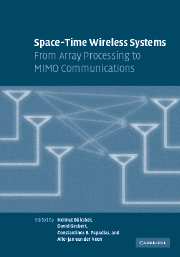Book contents
- Frontmatter
- Contents
- List of contributors
- Acknowledgments
- Introduction
- Part I Multiantenna basics
- 1 Propagation aspects of MIMO channel modeling
- 2 Beamforming techniques
- 3 Diversity in wireless systems
- 4 Fundamentals of MIMO channel capacity
- 5 Multiantenna capacity: myths and realities
- 6 The role of feedback, CSI, and coherence in MIMO systems
- Part II Space-time modulation and coding
- Part III Receiver algorithms and parameter estimation
- Part IV System-level issues of multiantenna systems
- Part V Implementations, measurements, prototypes, and standards
- Index
6 - The role of feedback, CSI, and coherence in MIMO systems
Published online by Cambridge University Press: 25 February 2010
- Frontmatter
- Contents
- List of contributors
- Acknowledgments
- Introduction
- Part I Multiantenna basics
- 1 Propagation aspects of MIMO channel modeling
- 2 Beamforming techniques
- 3 Diversity in wireless systems
- 4 Fundamentals of MIMO channel capacity
- 5 Multiantenna capacity: myths and realities
- 6 The role of feedback, CSI, and coherence in MIMO systems
- Part II Space-time modulation and coding
- Part III Receiver algorithms and parameter estimation
- Part IV System-level issues of multiantenna systems
- Part V Implementations, measurements, prototypes, and standards
- Index
Summary
Introduction
The growth in wireless communication over the past decade has been fueled by the demand for high-speed wireless data, in addition to the basic cellular telephony service that is now an indispensable part of our lives. Cellular operators are upgrading their networks to support higher data rates, and the imminent completion of the 802.16 and 802.20 standards is precipitating the move toward ubiquitous broadband wireless access. Increasing the capacity of current wireless links is perhaps the most essential step in realizing the vision of high-speed wireless data on demand, and adding multiple antennas at both the transmitter and the receiver is known to dramatically increase capacity. In this chapter, we explore the role of channel knowledge at the transmitter in multiple-input multiple-output (MIMO) systems. While feedback produces marginal gains in single-antenna communication, even partial channel knowledge at the transmitter is known to produce large performance gains in MIMO systems. We also consider the benefits of partial channel knowledge at the receiver in noncoherent systems.
For indoor wireless local area network (WLAN) systems with MIMO capabilities, such as the BLAST prototype, and emerging 802.11n standards efforts, the system bandwidth is typically smaller than the channel coherence bandwidth, which is large because of small indoor delay spreads. On the other hand, emerging high-speed outdoor wireless metropolitan area network (WMAN) communication systems, such as 802.16 and 802.20, can easily span a band that is several times the channel coherence bandwidth, which is smaller due to larger delay spreads in outdoor channels.
- Type
- Chapter
- Information
- Space-Time Wireless SystemsFrom Array Processing to MIMO Communications, pp. 108 - 130Publisher: Cambridge University PressPrint publication year: 2006



